Homo colossus, Planet-Devourers
In the process of building the expansive, non-living, human-serving world that supports “advances”, we inevitably consume and erase the living, non-human world. Generally, human cooperation on human interests has amounted to an evermore aggressive campaign against non-humans. For example, over the past 2000 years, humans have eradicated 45% of the biomass that had been present. When we pursue the “human right” to "decent living standards”, we’re really temporarily elevating our lifestyles above those of all other species at the cost of ecosystem health.
From Catton’s Overshoot:
"Both imperialism and the subsequent graduation of the earliest and richest colonial components of empires into the status of new nations had been results, not causes, of the age of surplus carrying capacity. The achievements of Homo sapiens have always required foundations other than the self-assurance and determination to which Roosevelt appealed. Sheer will-power, important as it can be, cannot be implemented without material resources and physical energy"
The high-metabolism network that supports us has a net-negative impact on our ecosystems. Much of the damage is invisible to those of us who benefit (temporarily) from the empire’s extractive campaigns and are insulated (temporarily) from their consequences. Members of human civilization think (if they think about it at all) that we’re expanding into empty space, but we were seizing land to produce calories meant only for us (and for the few creatures we consider useful), leaving other species to starve - and if they pass through “our” territory, we poison them, flatten them, electrocute them.
From Hospicing Modernity:
“[Civilization is] created and maintained by historical, systemic, and ongoing processes that are inherently violent and unsustainable… Modernity cannot exist without expropriation, extraction, exploitation, militarization, dispossession, destitution, genocides, and ecocides."
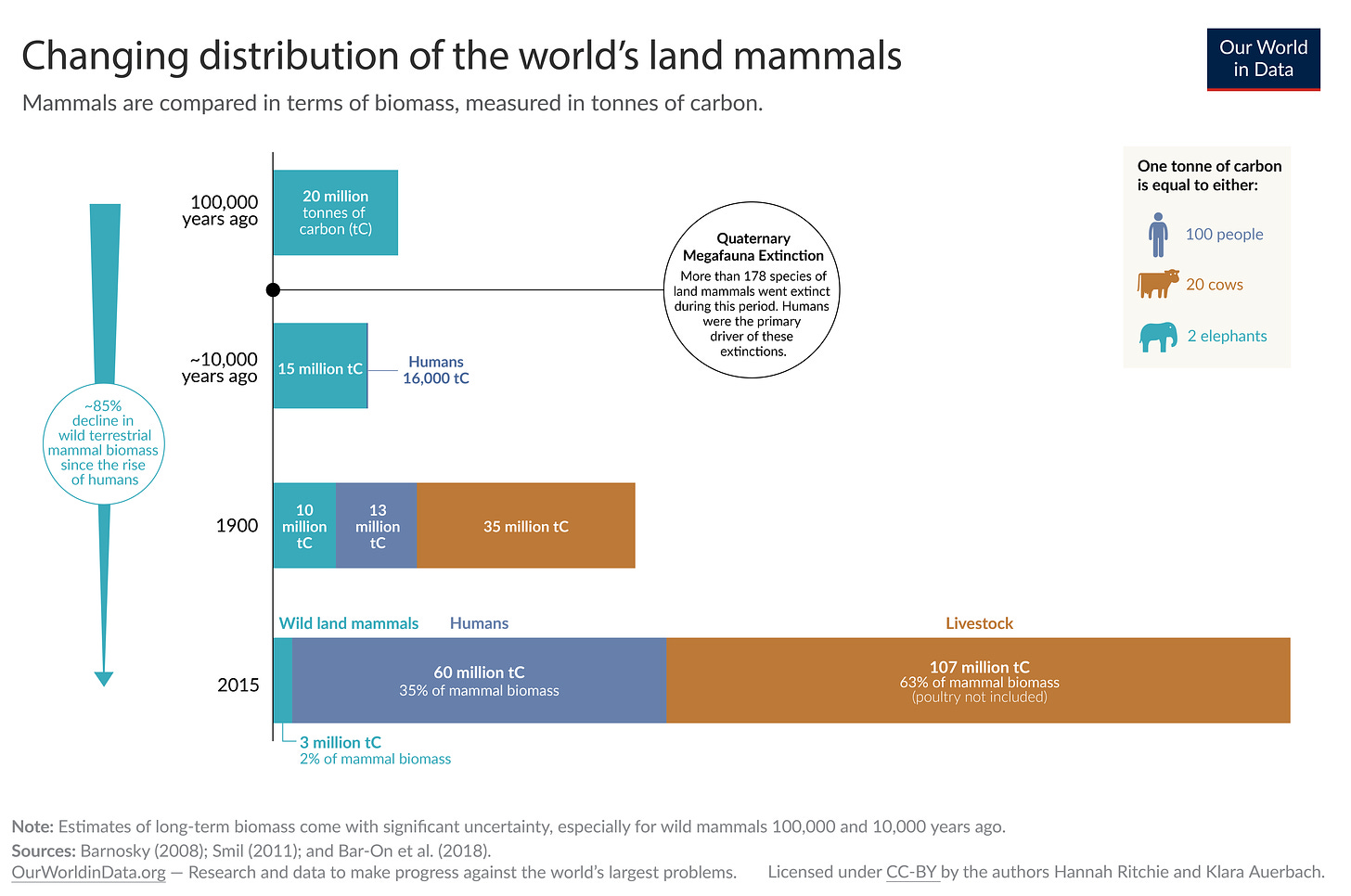
From Catton’s Overshoot:
"All humans alive today, being so many times more numerous than their pre-agricultural predecessors, depend for their existence upon man's success -thus far- in artificially converting a climax community (with minimal but permanent human carrying capacity) into a less mature seral stage (with greatly enlarged but precarious human carrying capacity). Although a climax community, or wilderness, has more inherent stability than a farm, it won't feed as many human beings because more of its total net production is consumed by other species."


From Tom Murphy in a post, “To What End?”:
“Even something as seemingly altruistic as health care selfishly focuses on human health, to the exclusion and often direct detriment of ecosystem health. Are we really doing ourselves favors in the long term by making the destructive human enterprise healthier, more populous, longer-living, and therefore better able to carry out its damaging activities? If this sounds abhorrently anti-human, it’s because the human enterprise is currently relentlessly anti-planet.”
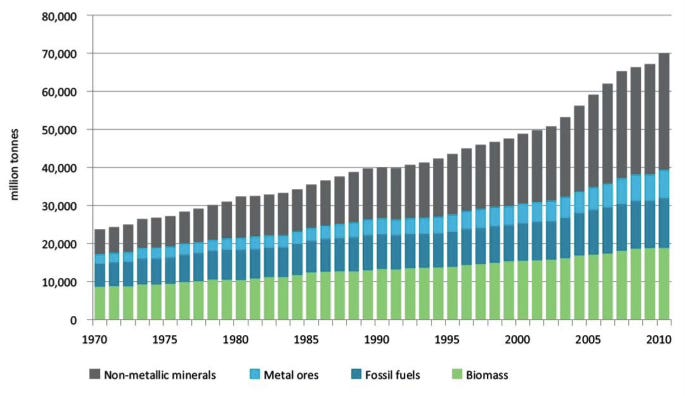
Social movements have seldom opposed the growth of humans' annual global resource consumption. Both things are true: The (ostensible) abolition of slavery and the legalization of gay marriage and the guarantee of warehouse worker bathroom breaks were triumphs for justice within our species... And they’ve been only that: victories for sub-groups of our species, earning them inclusion in and access to the dominant system’s spoils - while that system continued every year to increase the rate at which it annihilated non-human life.



photo sources: suffragettes / Pride / Amazon
As would-be Homo sapiens adopts the culture (behaviors and organizing models) of Homo colossus, is becomes a “species out of context” (in Wes Jackson’s words), overriding the original built-in checks and balances, but vulnerable to new threats that its “cheating” eventually creates. We’ve designed a world that requires enormous material and energy inputs. Its unavoidable, fatal costs are now catching up with us. An approach that is dependent on excessive resource exploitation inherently leads to bioregional burnout. All complex societies have been predisposed to be temporary. Modern techno-industrial civilization is no exception. This is just the first (and last) time that a Homo colossus colony -aided by a substance that took 300 million years to form, and which we are burning in a matter of centuries, and which might never have the right conditions to form again- has expanded to encompass, exploit and degrade the whole of Earth.
“Civilization is a hopeless race to discover remedies for the evils it produces”
-Jean-Jacques Rousseau
Our go-to problem-solving strategy (insofar as it entails further material resource consumption) is now the cause of our ailments and is not suitable as a response.
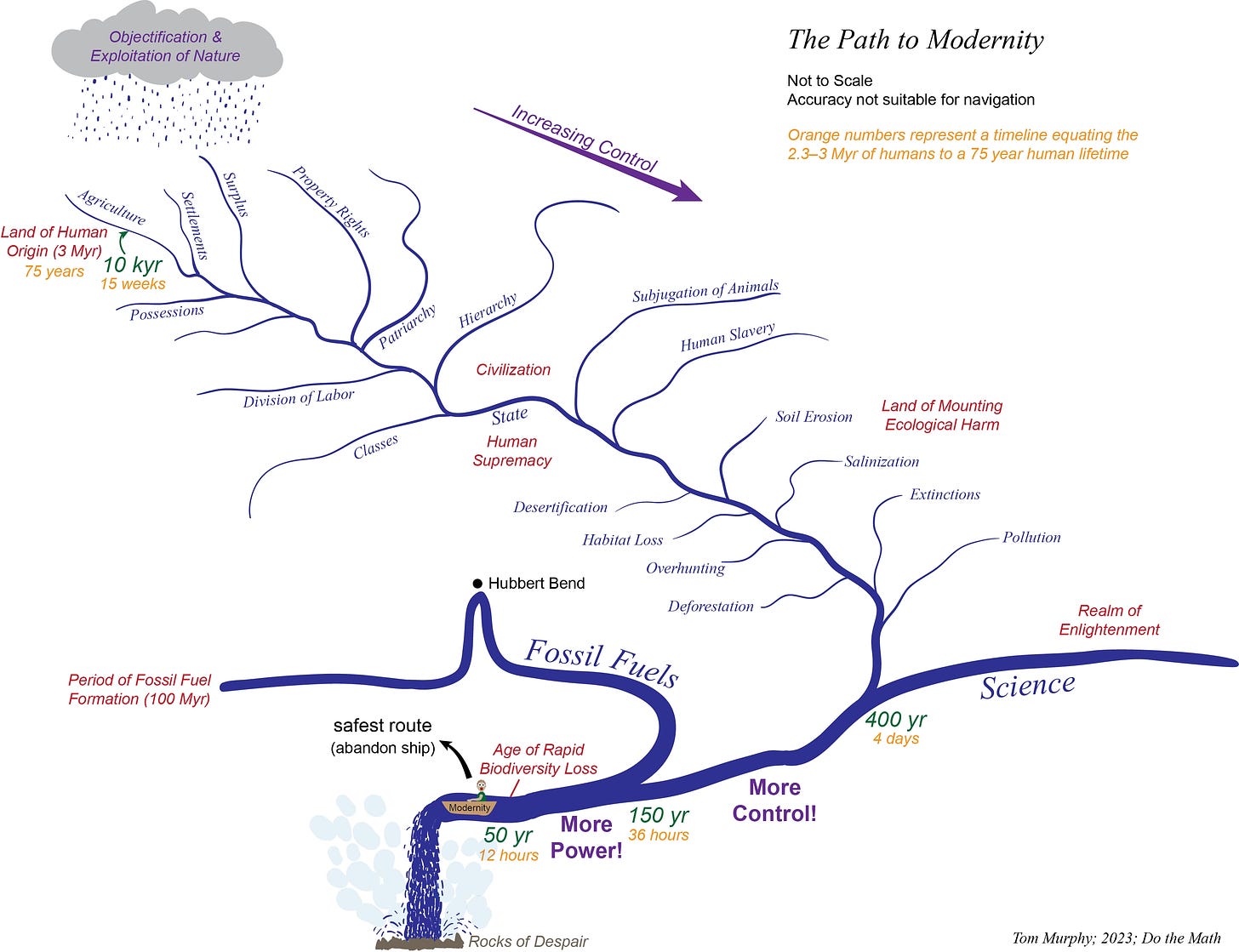
Overshoot
An ecosystem features sources and sinks. Sources can either be renewable resources, meaning they regenerate during a relevant timeframe, or non-renewable. Trees are renewable if given enough time to grow back. The metals and minerals that we fashion into solar panels, on the other hand, are non-renewable. They exist in a fixed quantity and the best we might do is recycle them through industrial processes. Society often refers to solar energy as “renewable”, but sunlight itself does not charge your electric vehicle - its usefulness for electricity generation is dependent on and limited by non-renewable resources. Sinks assimilate waste.
When a species’ rates of resource consumption and waste creation exceed sources’ and sinks’ ability to keep up, it exceeds its environment’s carrying capacity. We call this state “overshoot”. Since the 1980’s we’ve exceeded the carrying capacity of the entire planet.
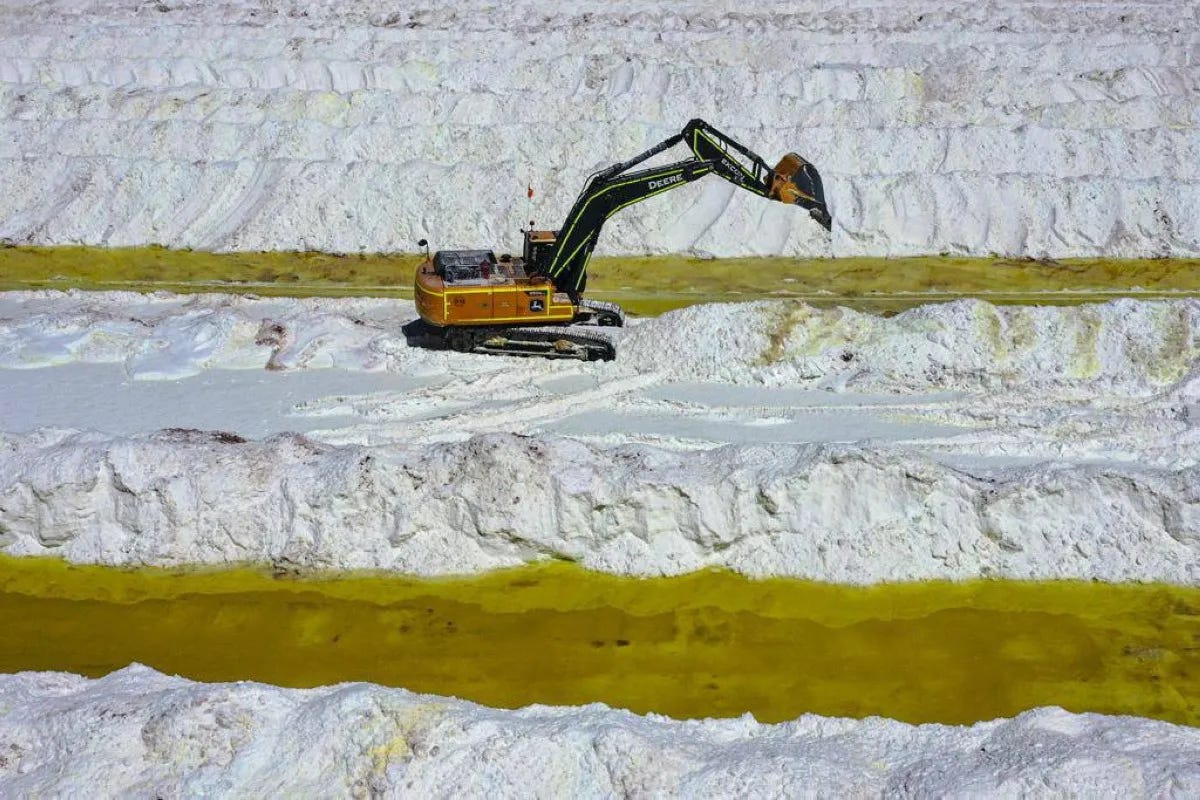
Our oversized ecological footprint is commonly expressed as “We’re now using 1.7 Earths per year.” World Overshoot Day, which in 2023 fell in August, marks the day after which we’re “over-budget” and, having “spent all the interest”, we “dip into the principal”. Each year, humans consume a greater amount of resources than during the previous year. We therefore keep accessing even more principal, which leaves behind less of it to generate interest. Then, the following year, between heightened consumption and declining interest generation, we take even more from the principal. We’re more and more over-budget.
“Anyone who believes indefinite growth in anything physical, on a physically finite planet, is either a madman or an economist”
- Kenneth Boulding (President of the American Economic Association, 1968)
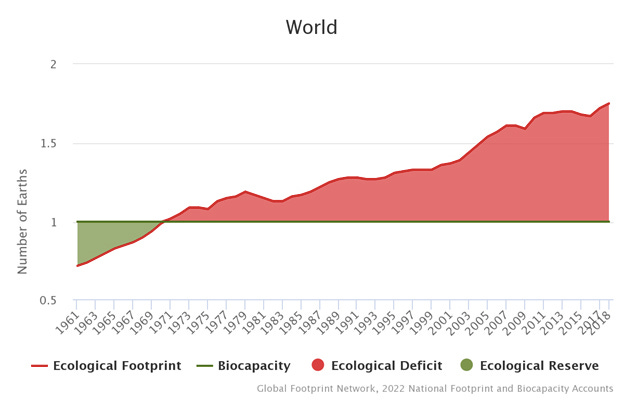
Deprived of Competence
Signs in parks read “Don’t Feed the Animals” but we rarely pause to contemplate the disservice that our own culture does to us. It numbs our instincts and domesticates us to the point that it’s now questionable whether machines are extensions of us, or the other way around. When global supply chains and refrigeration first emerged, our technologies as a source of mere “comfort and convenience” - for example, enjoying fresh fruit from a distant region - but as our technologies led to a burgeoning of the human population in regions that couldn’t otherwise support such high numbers and as recent generations ceased to learn self-provisioning skills, we’ve become utterly dependent on this industrial supply chain. A human who can feed herself only by being employed by a company and paid in currency which she then trades for food, is trapped. Most of us are so integrated into this impractically high-maintenance system that we wouldn’t survive long without it. That we panic during a power outage but feel little dread upon seeing flowers bloom in winter is a testament to how dependent contemporary generations are on machinery, and how divorced we are from the biotic requirements for our own long-term survival.
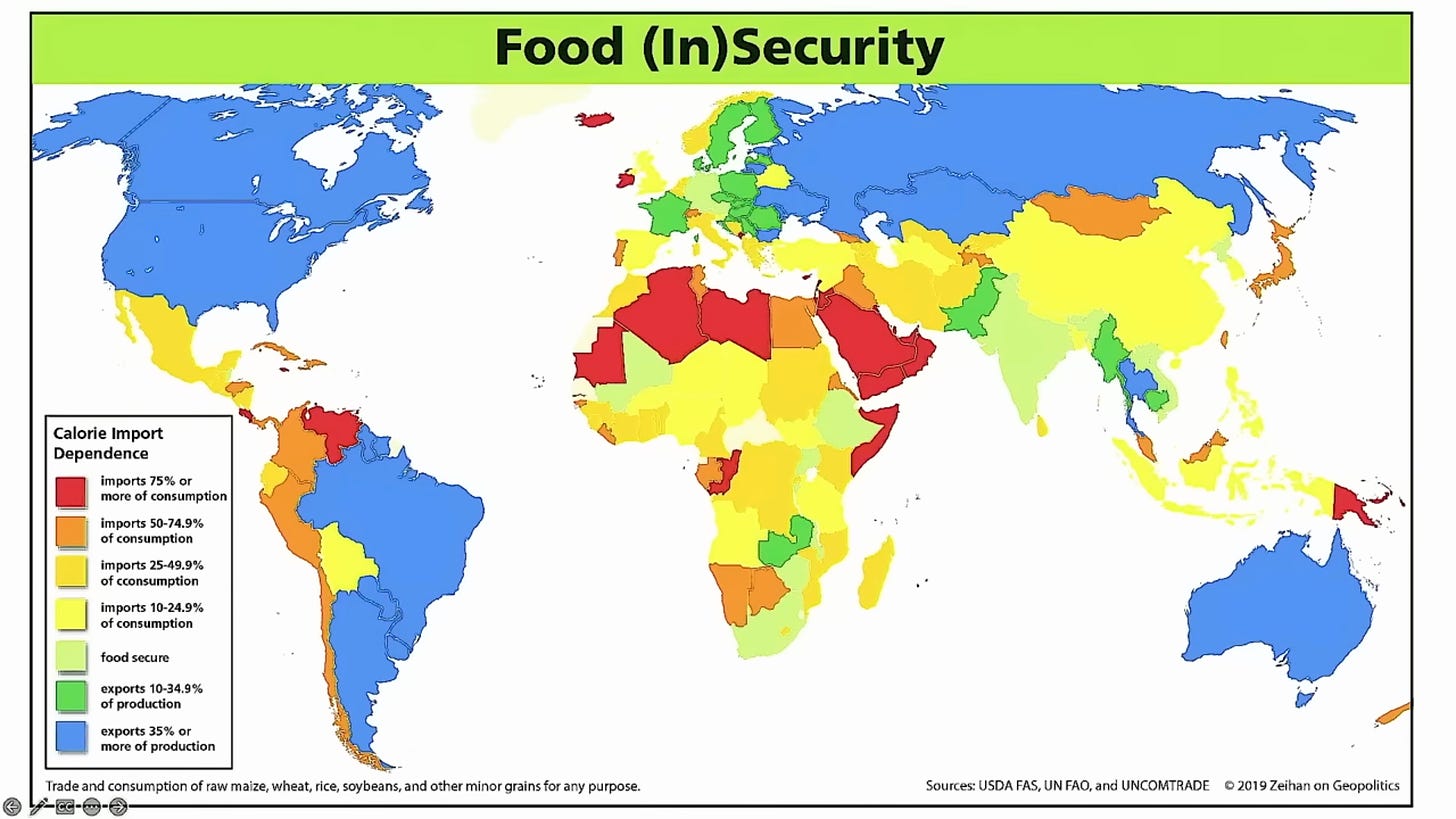

Complexities’ Own Afflictions
Peter Turchin coined the term cliodynamics for the application of data analysis to detect patterns in history. He wrote “Secular Cycles” and “End Times: Elites, Counter-Elites, and the Path of Political Disintegration”. The latter deals with the problem of “elite overproduction” and the political consequences of a ballooning tertiary economy.
Arnold Toynbee wrote about mimesis. Historically, as civilizations burgeon, a small group often proves more capable of problem-solving than the masses would otherwise be. They earn admiration and inspire imitation (mimesis), which generates a sense of shared values and purpose. John Michael Greer notes in “Dark Age America: Climate Change, Cultural Collapse and the Hard Future Ahead”, that eventually "the elite become so fixated on maintaining their own power and privilege that they stop doing an adequate job of addressing the problems”. The masses become disillusioned, stop conforming, turn against each other and turn to whichever new figure can address the problems that they face.
John Michael Greer’s paper “How Civilizations Fall: A Theory of Catabolic Collapse” describes how societies eventually go from taking “two steps forward, one step back” to “one step forward, two steps back”. Again, it comes down to how a “developed”, “advanced” society adds layers of maintenance requirements (e.g. asphalt, fuel, refrigerants) with which it eventually can’t keep up.
Joseph Tainter wrote “The Collapse of Complex Societies” about diminishing returns to innovation and the problems that complexity presents. As a civilization becomes more “developed”, technological “advances” mean that, within the three-sector model, the percent of job opportunities in the primary economic tier (harvesting raw material) shrinks, and people must seek work in the secondary and tertiary economic tiers as accountants, attorneys and HR managers. Such a society undermines itself from below. It becomes too administratively high-maintenance at the top and it crashes.
Competition Versus Cooperation Under Pressure
From Inside Climate News:
“At times of such huge uncertainty, a veritable plague of toxic public feelings can be unleashed, which provide the effective underpinning for political movements such as populism, authoritarianism, and totalitarianism … When climate reality starts to get tough, you secure your borders, you secure your own sources of food and energy, and you keep out the rest of them”
“When you see a big cycle of activism growing, you get a rise in counter-movements, particularly as activism becomes more confrontational, even if it’s nonviolent … And it will lead to clashes.”
From PCI’s “The Big Picture”, referring to this study:
“In the early phases of crisis, people typically respond with extraordinary degrees of cooperation and self-sacrifice …. But if privation persists, they may turn toward blame and competition for scarce resources”
Prompts to be more aware of mortality exacerbate tribalism.
On an episode of Post-Carbon Institute’s “Crazy Town” podcast (“An Ecofascist and a Social Justice Warrior Walk into a Bar: Extremist Politics and Censorship”), the hosts wonder:
“We’ve seen a frightening rise in recent years of violence and violent rhetoric by so-called ecofascists, who use environmental and resource limits arguments to justify hateful views around immigration and population. But does that mean those of us who are concerned about ecological limits should keep our mouths shut? … squelching discussions about limits might actually backfire and fuel ecofascist views instead”
Catton’s Overshoot describes how, when a given environment is oversaturated with one species, we see increasing rates of “mutual interference” and “redundancy anxiety”:
"As other mammalian species have moved into a post-exuberant stage, increased antagonism and competition typically have led to increased violence and behavioral degeneracy. Status hierarchies become more abrasive. Care and training of the young become inept and even reluctant; the young come to be treated as intruders. One result of these changes is a slowing down of the rate of population increase. Another is the suffusion of fear, hostility, and misery into all aspects of life."
Because coordinated action across a large population is difficult during times of adversity, resource shortages do not necessarily inspire conservation. For example, as Sudan’s civil war left people desperate for fuel, they decimated 45% of its forestland from 1983-2021.
Wealth inequality and political polarization also preclude the cooperation necessary for a civilization to overcome challenges, leading to collapse.
“Temperature spikes drive surges in everything from domestic violence to online hate speech … Baseball pitchers are more likely to intentionally hit batters with their pitches ... US Postal Service workers experience roughly 5% more incidents of harassment and discrimination on days above 32°C [89.6°F], relative to temperate days.”
Tom Murphy’s blog post “Was Modernity Inevitable?”
Tom Murphy’s blog post “The Ride of Our Lives” about civilization’s course
a post, “From Homo sapiens to Homo colossus”
Joseph Tainter interviewed by Nate Hagens
Diminishing returns to innovation - article 1, article 2, article 3
an article by Peter Turchin, “Welcome to the Turbulent Twenties”
an episode of Post-Carbon Institute’s “Crazy Town” podcast: Complexity and Armageddon
a short animation, “Hello Humanity, it’s me, Technology. We need to talk”
Chris Hedges’ article, “This Time the Collapse Will Be Global”
Goodreads page for “Immoderate Greatness: Why Civilizations Fail” by William Ophuls
Goodreads page for “Collapse: How Societies Choose to Fail or Succeed” by Jared Diamond
an episode of Post-Carbon Institute’s “Crazy Town” podcast, “Fear of Death and Climate Denial”
article & article about the “wellness-to-fascism pipeline” - the confluence of climate concerns, wellness gurus, fascism and conspiracy theorists
Goodreads page for “Tropic of Chaos” by Christian Parenti




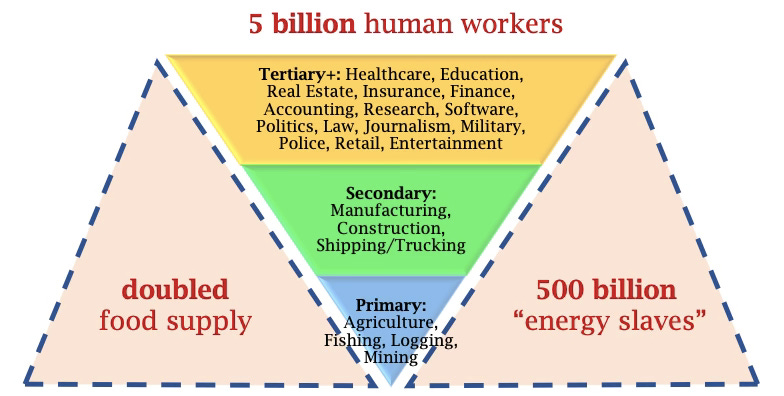

Thanks for your writing— you reference so many of the writers/speakers/thinkers I have also been following ever more closely over the last few years— and you distill the ideas so clearly and sequentially. We need more voices doing exactly this! As a teacher I’ve not had time to do my own writing, but whenever I find someone like you who has, I feel less alone in my collapse awareness and more steady on my path to post-doom.
Incredibly well written and researched. Thank you.
Makes me wonder how all of these delusional Malthusian billionaires plan on surviving the culling to come, while avoiding being on the list themselves.